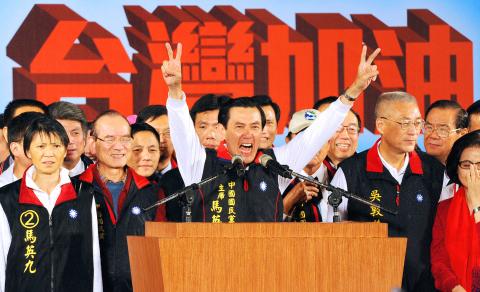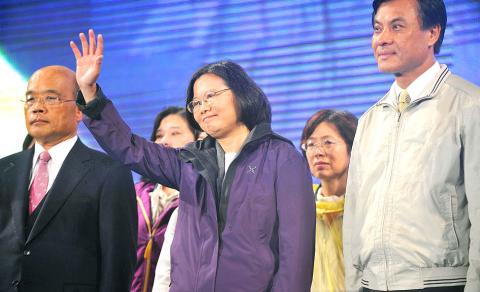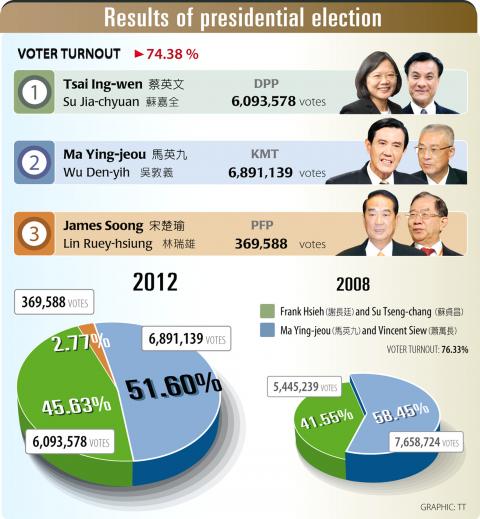President Ma Ying-jeou (馬英九) yesterday secured a second four-year term in office, ending the Democratic Progressive Party’s (DPP) hope for a return to power.
Ma won re-election with more than 6.8 million votes, leading his DPP challenger, Tsai Ing-wen (蔡英文) — who garnered more than 6 million votes — by about 800,000 votes.
According to the figures released by the Central Election Commission (CEC) after the vote counting process was completed shortly before 10pm, Ma received 6,891,139 votes, or 51.6 percent of the total votes; Tsai won 6,093,578 votes, or 45.63 percent of the total; while the People First Party’s James Soong (宋楚瑜) took 369,588 votes, or 2.77 percent of the total votes cast.

Photo: Toshifumi Kitamura, AFP
The voter turnout was 74.38 percent, with 13,452,016 of the 18,086,455 qualified voters casting their votes, CEC figures showed.
Central Election Commission Chairwoman Chang Po-ya (張博雅) announced the numbers immediately after the vote-counting process was completed at a press conference at the Vote Counting and Information Center in Taipei.
“The figures will be finalized at a CEC meeting on Jan. 19,” Chang said. “After the commission confirms the numbers, we will publish the official results.”

Photo: Patrick Lin, AFP
Although Ma won, the total number of votes he received dropped by more than 767,000, from 7,658,724 in 2008, when he received 58.45 percent of the total vote.
On the other hand, votes for the DPP’s presidential candidate increased by 648,000 from 5,445,239 votes in 2008, a growth of 4.05 percent.
Speaking before thousands of jubilant supporters at his national campaign headquarters in Taipei, Ma said his cross-strait policies had resonated with voters.

GRAPHIC: TT
“They gave us support for our policy to put aside differences with the mainland [China], to search for peace and turn it into business opportunities,” he said.
“This is not Ma Ying-jeou’s personal victory, but one for the Taiwanese people. It’s also a victory for our direction toward a clean government, prosperity and peace,” he said.
“I want to thank everyone for your support that has given me the opportunity to achieve the changes Taiwan needs in another four years [in office]. I will never let you down,” he added.
Ma’s re-election is set to be seen in Beijing as a big victory for Chinese President Hu Jintao (胡錦濤), who has moved away from China’s previous policy of repeatedly threatening Taiwan with war and instead has tried to woo Taiwanese by showing the economic benefits of closer ties.
There was no immediate reaction from Beijing on the election results.
Tsai conceded defeat at a press conference in New Taipei City (新北市) soon after Ma spoke to his supporters.
Tsai congratulated Ma on his victory and offered to resign immediately as DPP chairperson, saying that she took full responsibility for the loss.
“It was never easy to challenge an incumbent president. We didn’t do well enough in central and northern Taiwan. I am sorry that I have let our supporters down,” Tsai said.
“I know everyone is sad about the result. It’s OK to cry,” she added. “It is OK to feel depressed and disappointed, but don’t be frustrated and don’t give up. We still need to fight for Taiwan with optimism.”
Tsai urged Ma to listen to the people’s voice in his second term and despite his victory, she still thinks that a domestic consensus is essential before engaging in any further negotiations with Beijing.
She expressed her gratitude to her supporters, saying that their determination for reform should be carried on and that the DPP would be back in the future.
This was the second time Soong has run for president, following his initial bid in 2000, when he received 4,664,932 votes — 36.8 percent of the total votes at the time — and was the candidate with the second- highest number of votes.

CHAOS: Iranians took to the streets playing celebratory music after reports of Khamenei’s death on Saturday, while mourners also gathered in Tehran yesterday Iranian Supreme Leader Ayatollah Ali Khamenei was killed in a major attack on Iran launched by Israel and the US, throwing the future of the Islamic republic into doubt and raising the risk of regional instability. Iranian state television and the state-run IRNA news agency announced the 86-year-old’s death early yesterday. US President Donald Trump said it gave Iranians their “greatest chance” to “take back” their country. The announcements came after a joint US and Israeli aerial bombardment that targeted Iranian military and governmental sites. Trump said the “heavy and pinpoint bombing” would continue through the week or as long

TRUST: The KMT said it respected the US’ timing and considerations, and hoped it would continue to honor its commitments to helping Taiwan bolster its defenses and deterrence US President Donald Trump is delaying a multibillion-dollar arms sale to Taiwan to ensure his visit to Beijing is successful, a New York Times report said. The weapons sales package has stalled in the US Department of State, the report said, citing US officials it did not identify. The White House has told agencies not to push forward ahead of Trump’s meeting with Chinese President Xi Jinping (習近平), it said. The two last month held a phone call to discuss trade and geopolitical flashpoints ahead of the summit. Xi raised the Taiwan issue and urged the US to handle arms sales to

State-run CPC Corp, Taiwan (CPC, 台灣中油) yesterday said that it had confirmed on Saturday night with its liquefied natural gas (LNG) and crude oil suppliers that shipments are proceeding as scheduled and that domestic supplies remain unaffected. The CPC yesterday announced the gasoline and diesel prices will rise by NT$0.2 and NT$0.4 per liter, respectively, starting Monday, citing Middle East tensions and blizzards in the eastern United States. CPC also iterated it has been reducing the proportion of crude oil imports from the Middle East and diversifying its supply sources in the past few years in response to geopolitical risks, expanding

Pro-democracy media tycoon Jimmy Lai’s (黎智英) fraud conviction and prison sentence were yesterday overturned by a Hong Kong court, in a surprise legal decision that comes soon after Lai was jailed for 20 years on a separate national security charge. Judges Jeremy Poon (潘兆初), Anthea Pang (彭寶琴) and Derek Pang (彭偉昌) said in the judgement that they allowed the appeal from Lai, and another defendant in the case, to proceed, as a lower court judge had “erred.” “The Court of Appeal gave them leave to appeal against their conviction, allowed their appeals, quashed the convictions and set aside the sentences,” the judges